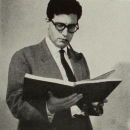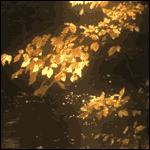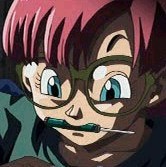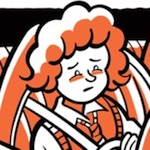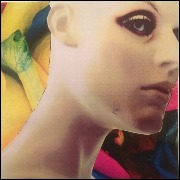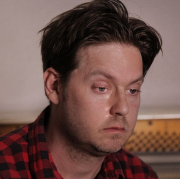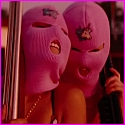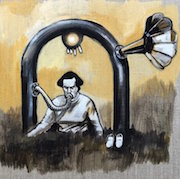|
Solitair posted:Are there any good podcasts about literature? Pill Pod is mostly about critical theory, but they will do literature every once in a while. Their Bartleby episode is very good.
|
|
|
|

|
| # ? May 20, 2024 06:39 |
|
I like Literary Hangover but they mostly talk about early/Frontier days American literature and they only update like twice a year.
|
|
|
|
Solitair posted:Are there any good podcasts about literature? Michael Silverblatt's Bookworm. The KCRW app has backlogs that go back decades.
|
|
|
|
Solitair posted:Are there any good podcasts about literature? I like Sacred And Profane Love. A philosopher brings in a guest each episode to talk about a book. It can swing between academic and personal.
|
|
|
|
Not to be confused with Sacred and Propane Love my King of the Hill rewatch podcast
|
|
|
|
Gaius Marius posted:Honestly that might be it, I got on a big Nabokov kick awhile ago and decided to check out some podcast on Pale Fire while I traveled across the states. Horrible mistake, they spent a good 30 minutes debating if it was Modernist or Post Modernist for zero purpose and then introduced me to the Hazelite interpretation which can just get fully hosed. i do admit i was curious about where on earth you would have encountered a hazelite "in the wild" when i wrote all those words about it in wherever thread it was you were talking about it earlier. i should have guessed it would have been "niche podcast"
|
|
|
|
Guy A. Person posted:The review is pretty funny because Holden is a bitch but then she's out there retweeting stuff like "I haven't even read this dumb book but this review is all I need!" and saying everyone who disagrees is "defending Holden's behavior" and it is pretty grim Thereís half a case to be made that itís an artifact of a dead culture that is still reflexively treated like it speaks with immediacy to the experiences of the children who read it now. Like, I can imagine English teachers in the 50s making a progressive case for including literature in schools that reflects the interests and emotional needs of the children reading them, and Salinger being more culturally relevant than Walter Scott or something. But even if children find the text interesting, I donít know how the strong confessional element and introspection and self-disclosure vs insincere polite/respectable culture plays in a world where everyone is expected to ceaselessly vomit every half-formed thought out onto the internet for praise and attention, not unlike that lady is doing in her review where she play-acts what a sex worker in the 1950s might be thinking. Or how kids who spend half their day talking about mental illness and being encouraged to imagine a shooter busting into class and slaughtering them receive a text that imagines therapy as secret or shameful. Then again, it might just be assigned so commonly because itís at an appropriate reading level that kids at the median level of skill can reliably understand. And maybe kids never really got it and Iíd like it more if I read it as a grown man vs at 15.
|
|
|
|
I AM GRANDO posted:Thereís half a case to be made that itís an artifact of a dead culture that is still reflexively treated like it speaks with immediacy to the experiences of the children who read it now. Like, I can imagine English teachers in the 50s making a progressive case for including literature in schools that reflects the interests and emotional needs of the children reading them, and Salinger being more culturally relevant than Walter Scott or something. But even if children find the text interesting, I donít know how the strong confessional element and introspection and self-disclosure vs insincere polite/respectable culture plays in a world where everyone is expected to ceaselessly vomit every half-formed thought out onto the internet for praise and attention, not unlike that lady is doing in her review where she play-acts what a sex worker in the 1950s might be thinking. Or how kids who spend half their day talking about mental illness and being encouraged to imagine a shooter busting into class and slaughtering them receive a text that imagines therapy as secret or shameful. This sounds like a really good foundation for a discussion, though?
|
|
|
I AM GRANDO posted:Thereís half a case to be made that itís an artifact of a dead culture that is still reflexively treated like it speaks with immediacy to the experiences of the children who read it now. Like, I can imagine English teachers in the 50s making a progressive case for including literature in schools that reflects the interests and emotional needs of the children reading them, and Salinger being more culturally relevant than Walter Scott or something. But even if children find the text interesting, I donít know how the strong confessional element and introspection and self-disclosure vs insincere polite/respectable culture plays in a world where everyone is expected to ceaselessly vomit every half-formed thought out onto the internet for praise and attention, not unlike that lady is doing in her review where she play-acts what a sex worker in the 1950s might be thinking. Or how kids who spend half their day talking about mental illness and being encouraged to imagine a shooter busting into class and slaughtering them receive a text that imagines therapy as secret or shameful. Goddamnit I do not want to do this again. It was not a book for children. It was not a book for children. Please stop making me do this. I don't even like Salinger. I AM GRANDO posted:Or how kids who spend half their day talking about mental illness and being encouraged to imagine a shooter busting into class and slaughtering them receive a text that imagines therapy as secret or shameful. This is the reactionary mindset that consumed Holden. mdemone fucked around with this message at 21:57 on Sep 11, 2022 |
|
|
|
|
mdemone posted:Goddamnit I do not want to do this again. The assignment of books in school has nothing to do with their intended audience. People are assigned the Scarlet Letter and Macbeth at the same age. The post is about what is perceived as being appropriate or interesting to children.
|
|
|
I AM GRANDO posted:People are assigned the Scarlet Letter and Macbeth at the same age. Gotcha, you don't have kids in American high schools. Could've just said that.
|
|
|
|
|
mdemone posted:Gotcha, you don't have kids in American high schools. Could've just said that. I read these things in American high school.
|
|
|
Zurtilik posted:I read these things in American high school. So did I. That was quite a while ago. AP Lit courses don't teach Hawthorne during junior year, and Macbeth isn't the Shakespeare that is suggested for senior year. Salinger has fallen out of favor because, again, it was never a book for children.
|
|
|
|
|
Gaius Marius posted:then introduced me to the Hazelite interpretation which can just get fully hosed. I've tried searching this up but can't find anything about it. Can you explain who or what that is?
|
|
|
|
Gaius Marius posted:Also while you can see the Incel adajcentness of Faust, and I myself have made jokes to the effect of that, I've seen some people double and triple down on that trait to the effect that they lose the whole rest of the plot. Yeah the sex stuff is there and significant, but it's just one thing among many he's missed in his isolation. Haven't had time to get back into it, but I appreciate your commentary here.
|
|
|
|
Click the question mark and go back a page of my posts and me and another person were talking about it. The gist is that some people have gone past the Idea that John Shade is the actual author of Pale Fire (novel) instead of just the poem and that the commentary is an inherent part of what he was doing, into the idea that Hazel shade was the author speculating on her life and the lives of her family after she embraces her last name. I just think it's a ridiculous idea that is just throwing poo poo at a wall to find something new instead of a particularly insightful or interesting way to read the work.
|
|
|
|
Carly Gay Dead Son posted:This sounds like a really good foundation for a discussion, though? For sure, though itís different from the discourse that seems like it haunts these silly takes that are about accessibility or suitability for classroom instruction. Maybe Iíve never thought about why twitter dopes post about that novel in particular. Maybe itís also that I donít understand the goals of high school, which probably include literacy and some ideological purpose involving familiarity with a canon of ďAmerican literatureĒ as well as a definition of what constitutes a classic or serious literature. I donít know the extent to which thatís considered explicitly.
|
|
|
|
Ada, or Ardor Nabokov and possibly Americaís greatest work of literature. Nabokov started out the novel as a parody of the classic family chronicle, managing to out write most of his influences in terms of prose, cleverness, and humor in the process. But then also creating the masterful philosophical work on the nature of time and memory, that becomes more and more solid the farther into the contemporary we get culminating in Vanís trip to meet Ada in Switzerland. The whole of the structure is truly beautiful. Of course the halcyon days of Van and Adaís youth take up such a prominent place in the narrative, theyíve both spent decades reliving those memories over and over, together and in private, reliving them when they were young children, young adults, professionals, and senior citizens. We think of whatís current as the most real and the past as mostly ethereal, but for memories the farther back they are the more youíve had time to relive them. Vanís time adoring arbors didnít last fifteen minutes forty years ago, it lasted fifteen minutes for forty years. More than that the memories of the first Ardis visit themselves seem to take on this fantastic heightened quality, like a fairy tale. Guided by Nabokov beautiful prose every branch on every tree, family included, is made as beautiful as it is ethereal. The sun beams are always casting their rays just so, and the grass is always perfectly verdant. Van and Ada are both wise far beyond their years, precocious, and always have the perfect jab or thrust to counter any phrase thrown their way. How much of this is Vanís embellishment and romantic nature, a fact that Demon calls out in reply to Vanís letter of Lucettes fate, and how much is them just being savantís is anyone's guess. Iíve seen a few people point out something I noticed, when we finally see them come into careers they donít seem nearly as luminescent as their previous descriptions would lead you to believe they would be. Van is a career Psychologist and a very young member of the board, but it seemed that Demon was bribing and cajoling the faculty and boards partly to support his son, and partly to keep him focused on not loving his sister(s). He explicitly supports Ada as well, whom it seems carried on in the Marianan fashion of taking strings of lovers and having children from said affairs. A fact that she allows Van to mistake as Demon getting up to some Humbert business. But, I also think the fracturing of the ardis affair left them both adrift, and each chose to cope in ways that donít necessarily play into their strengths. I donít think Ada seemed all that excited about her mothers career in the starting chapters, she seemed pretty turned off about the whole filming in the second ardis episode, and yet we see that sheís incredibly desperate to get ahold of Van again, somehow, after he fights his duel. Using the Letters, but also in becoming an actress sheís attempting to at least get him to see her again in the same vein as Jesseís novel in the Before Trilogy, it turns out her plan works but in a disastrous way. Van might have gone into Terrapy given what happened to Aqua, but when you read the beginnings of his career it coincides with and helps satisfy his writing career. The culmination of which, Letters from Terra seems physically based on his insane patients ramblings, but emotionally based on his conflicting desire to see Ada and the feeling that the affair would always be doomed and theyíd always be apart. Ada stays an actress for most of the text of the novel, but seems not at all bothered about giving it up when she shacks up in Cordulaís Crib. And her talking of trying to be a great actress felt more like her wanting to master a skill than to follow a passion of hers, and after she discovers Vineland it serves as a convenient excuse to not be stuck in Arizona watching cows gently caress. Van also throws himself into his career whenever heís apart from Ada, but his enthusiasm seems to wane heavily whenever a meeting nears, most explicitly when he fakes a heart attack rather than lecture for even a single second more. Hilariously the Venerated Veens best works are a movie where Ada didnít act, and Vanís greatest contribution to Terrarist thought is from a movie he inspired but canít take credit for. Iíve heard that Nabokov found both the Veenís pretty reprehensible, which is pretty objectively true. Van is an rear end in a top hat constantly flaunting his wealth and privilege to his staff and servants, he kills and maims other people who get in his way ( the captain and Kim), and he constantly cheats on his pseudospouse so much so that the way he stops cheating is to think about how much he wants to cheat and takes pleasure in the denial. Ada meanwhile cuckolds her husband and is more culpable than even Van in the death of Lucette ( a fact that seems still haunts her even into her nineties). Both of them act like the absolute worst kind of rich assholes that you can possibly imagine, their only saving grace is that their ambitions is after one another and not political or monetary power. And yet, I donít hate either one of them, or perhaps I donít hate their love for eachother. On Terra it would be reprehensible, but I find it hard to read the text as a condemnation of that specific aspect of them. Demonia or AntiTerra feels malicious and suffused with evil in such a way that even a sin like incest doesnít feel as immoral; If one sins in hell is it really a sin? Can their souls travel together to Terra, will they become one like in the end of the book. Will they be separate and meet again, hopefully as nonsiblings. Or is everyone and everything on antiterra as doomed as Lucette? Regardless the text takes this shape, one thinks it to be like a butterfly. A form of symmetry. But it seems to be a spiral to me, the work purports to be a family chronicle, but the incest laden tale ends with the Veens Vanquished. The family tree collapses, AquaMarina, and DemonDan, funnel into Van and Ada, who in turn vanish into a single point of Vanaida. Perhaps their only refuge is not to live on terra but to be written on terra, their deaths into the pages of the work serve the same function as the death described by Van Veen in Lucettes words. An endless series of subdivisions of partial death, from the second you open the book the Veens exist, living and dead, their memories endlessly stretching forwards unto death. The work gave me an odd feeling, I almost felt like Van without Ada or vice versa when Iíd finished. The work is huge, filled with detail, masterful prose, description and philosophy but something always feels missing. Itís incomplete by design. For a novel called Ada, or Ardor itís calling out for its non existent companion, Van, or Vanity (name subject to change). Near the end we see that the two have become near enough to one being, but what about the other frayed end of that rope? For as much as Van tells us of himself and his sister, she still maintains the enigmatic quality that Van is so attracted to. Like if you made an entire character from Catherines smile. Other Misc. thoughts I didnít really get a hang of Dan Veen. I thought for awhile the text was implying him to be gay. But he is still Lucettes father. I donít know how aware he was of Marinaís constant cheating or what exactly how strange Demonís description of him is in his first scene or in his death scene. Is Lucette, the woman who canít find any meaning or pleasure in her life without someone else, being the person who canít find KLITORI Nabokovís most meanspirited joke? Demon showing up, high as hell, in his sonís suite unaware that sisters suit his son is such a funny scene. drat near had tears in my eyes, that and Demon getting around Vanís bribery of the doorman by just being more generous with his gold. Iíve not read that, or any, Chekov play that is adapted with Marina starring as the deaf nun. Is it to imply that she was on some level aware of the Ardis Affair the whole time and was just ignoring it. She brought up for Van to stop seducing Lucette, but once weíre out of the Ardent narrative itís clear that most of the staff understood what was happening, Blanche, Lucette, Boutellian, and Kim at least. She was open enough with her realization late in life that she told Vinalanderís sister. But is it true that Demon told her, or that her failing health collapsed her mental barriers preventing her from seeing the truth. Secondly, Am I the only one who thinks that she was trying to seduce Van when he comes to her room to talk about Lucette, the same scene where heís desperate to try and see her as his mother? Why did he end up in such a relationship with Cordula, she didnít seem anything like Ada. And he never had anything more than flings with anyone else. But something made him hang on to her in a way that he didnít with anyone else? Would everyone have been better off if he had just returned to Ardis with Lucette? What exactly is the nature of Demonia. Are they all demons or fallen angels. Some descriptions border on either demonic or angelic, Lucette could be Lucifer? Van loses his innocence plucking a fruit, Ada, from a tree in the garden. How much of Demonia real? Maybe it's just me but there's a phantasmal quality to the world, characters seem to all fall into strange categories or titles and places and people seem to exist only to remind Van of Ada or Ada of Van. Things don't seem to exist beyond the senses of the pair, culminating in the book closing off to just a few rooms for the last 40 years of their life vs. the vast tapestry of their life previously even if it's the most happy moments of their lives. And then in the end as they both embrace oblivion the story itself closes and ends with a review of itself. What exactly is the meaning of water in the novel. Marina and Aqua are both named after it, Aqua believes itís talking to her, Lucette drowns in it, Dorophones take the place to Electrophones. If Terra is Demonian heaven, are the voices in the water the voices of angels trying to baptize the damned? Are vanís words more impactful than he realized and Lucettes are doomed on Demonia, because their souls are saved and moved to Terra? Is their meaning in Ada and Van moving to the area of Europe farthest from the sea or ocean? Is there a single worse feeling in the world realizing you'll never reach the prosaic heights of Nabokov? Gaius Marius fucked around with this message at 04:33 on Sep 12, 2022 |
|
|
|
Gaius Marius posted:Is there a single worse feeling in the world realizing you'll never reach the prosaic heights of Nabokov? Yeah, getting kicked in the nuts
|
|
|
|
gout e: I started reading some Bukowski on the bog last night, and I still don't know if he's good or bad. (Poems, not prose.) 3D Megadoodoo fucked around with this message at 12:23 on Sep 12, 2022 |
|
|
|
mdemone posted:So did I. That was quite a while ago.
|
|
|
|
I'm a page late but Antony and Cleopatra rules. My hot Shakespeare take is that the "big four" are Hamlet, Macbeth, King Lear and Antony and Cleopatra. Othello is overrated and doesn't really work. I read William Faulkner's As I Lay Dying and it was extremely good. It was a bit of a tough and tiring read (don't think it held that my e-book copy had some formatting issues), but after I finished I immediately went back and read the first third of it again, now I was oriented in the the story and the characters, and it was pure pleasure the second time round. I'm going to move on to The Sound and the Fury soon. I also read Gabriel Garcia Marquez's Memories of My Melancholy Whores, and, uh, that was a book. Very slim and definitely second-tier Garcia Marquez, but still with lots of the incidental delights you'd expect from his prose. Very creepy central premise, however. I couldn't get a grip on the book's perspective on it, and would be interested to hear from anyone else who has read it. I feel like the novel regards the situation as pathetic and sad, but ultimately it carries the possibility of redemption. Whereas I was just like "this is an incredibly gross sex crime, no thank you." And the novel didn't seem to fully realise that, if that makes sense? Finally, I recommend the latest Lauren Groff, Matrix. Fictionalised story of a 12th-century royal bastard who becomes prioress and then abbess of a dilapidated abbey which has fallen on hard times, and she turns its fortunes around. It's a deliberately idealised vision which still has enough shadows to keep it interesting. Its "misfit but omni-competent" protagonist"and present-tense narration felt indebted to Wolf Hall in some ways, although it's aiming for a different kind of revisionism.
|
|
|
|
there's an antonio lobo antunes interview where he says that he admires nabokov's writing but he also finds him kind of irritating because he's constantly appearing really smart at all times, whereas a faulkner for example sometimes comes across as kind of stupid even though he's a great writer, and that's much more relatable.
|
|
|
|
Nabokov was also irritated at being smarter than everybody else. I forgot what he said about Faulkner but I'm sure it was catty.
|
|
|
|
|
Everyone is talking about AntŰnio Lobo Antunes nowadays. I have a strong sense that he's becoming a Canon Guy
|
|
|
|
mdemone posted:Nabokov was also irritated at being smarter than everybody else. i mean if you wrote Lolita and then everyone took it as a romance wouldn't you want to kill yourself for how dumb they all are
|
|
|
|
ive had lobo antunes on my to-read for ages
|
|
|
|
nobakov
|
|
|
|
reading Street of Crocodiles and it's weird. the perspective of a five-year-old with an adult vocabulary sounds about right
|
|
|
|
The further I dive back into McCarthy's work - and I've only yet reread Suttree and No Country for Old Men, with plans to reread everything else as well - the more The Passenger seems like a rich summation of one of American literature's richest bodies of work. Parallels, thematic resonances, and evolutions abound here. And I haven't even yet seriously tackled Stella Maris.
|
|
|
Criminal Minded posted:The further I dive back into McCarthy's work - and I've only yet reread Suttree and No Country for Old Men, with plans to reread everything else as well - the more The Passenger seems like a rich summation of one of American literature's richest bodies of work. Parallels, thematic resonances, and evolutions abound here. And I haven't even yet seriously tackled Stella Maris. Please stop. I can only get so erect.
|
|
|
|
|
I will read and immediately compare to 2666.
|
|
|
|
J R not having any chapters or subdivision is destroying my mind. I was flipping through it last night absolutely exhausted trying to find some stopping place and I just couldn't.
|
|
|
|
ThePopeOfFun posted:I will read and immediately compare to 2666. Is Bolaño real literature? I've read the ice rink book and it's extremely "any French crime novel from the 1960s" to me.
|
|
|
|
Im not a fan at all but he is very well regarded for some reason I canít comprehend
|
|
|
|
blue squares posted:Im not a fan at all but he is very well regarded for some reason I can’t comprehend It was fine. I'm going to read 2666 at some point but it's frankly too big to read on the bus or in bed.
|
|
|
|
bolaŮo is genre
|
|
|
|
And what genre is that?
|
|
|
|
good stuff
|
|
|
|

|
| # ? May 20, 2024 06:39 |
|
derp posted:And what genre is that? Spirit of science fiction i'd imagine
|
|
|



